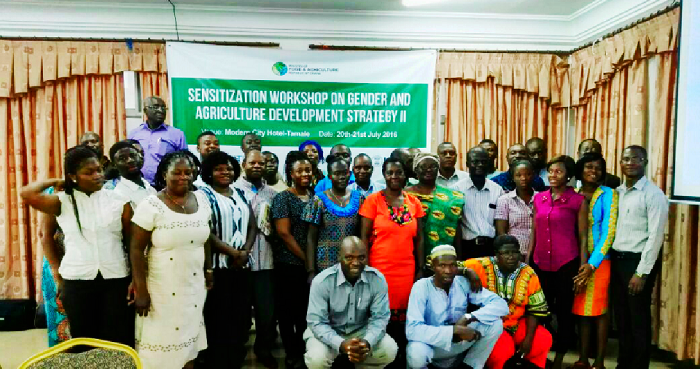
Women farmers need financial support to expand farms and reduce poverty
Women in Ghana and Africa in general contribute largely to agriculture by providing labour for planting, weeding, harvesting and processing, resulting in 70 per cent of food crop production in the country.
Advertisement
With a mandate to integrate gender concerns in policies, programmes and projects of the Ministry of Food and Agriculture, the Women in Agricultural Development Directorate (WIAD), one of the seven technical directorates of the Ministry of Food and Agriculture (MOFA), launched the Gender and Agricultural Development Strategy (GADS II) in January this year.
At a two-day sensitisation workshop on the GADS II, organised for farmer-based organisations, civil society organisations, district and regional departments of agriculture staff and media practitioners in Tamale in the Northern Region, the Deputy Director of WIAD, Mrs Victoria Aniaku, called for financial support and policy direction for female farmers in the country.
Support for women farmers
She said if female farmers are supported financially and policy-wise, it would enable them to expand their farms and agribusinesses, thus reducing poverty among such population in the agricultural sector.
She stated that more than 48.7 per cent of the country's women population were employed in the agricultural sector.
The workshop, jointly organised by the USAID Ghana Feed the Future's Agriculture Policy Support Project (APSP) and WIAD, was attended by participants drawn from Ashanti, Brong Ahafo, Northern, Upper East and Upper West regions.
The objective of the workshop was to train the participants in GADS II, after which the trainees would mainstream the strategy in their activities, projects and programmes and further continue with an expanded community sensitisation of the strategy.
Mrs Aniaku was of the view that the country could reduce poverty among the female population by increasing its support for the agricultural sector, particularly towards female farmers since most women depended on the sector for their livelihoods.
She explained that the purpose of the GADS II was to provide guidance to the Ministry of Food and Agriculture, its agencies, decentralised departments, civil society organisations, private sector and development partners to be more gender-responsive in their programming and interventions.
GADS II
The GADS II, a revised version of GADS I, was developed in 2011 to address inequalities in the agricultural sector and adopt a gender mainstreaming approach to provide the framework for achieving a gender-sensitive, equitable and efficient agricultural sector.
GADS II has nine strategic objectives and sub-strategies to address gaps identified in the agricultural sector and an action plan with broad activities, to guide implementation and monitoring.
A Policy Advocacy Specialist for the USAID APSP, Mr Yakubu Iddrisu, said effective implementation of GADS II would require commitment from all stakeholders at all levels within the agricultural sector.




